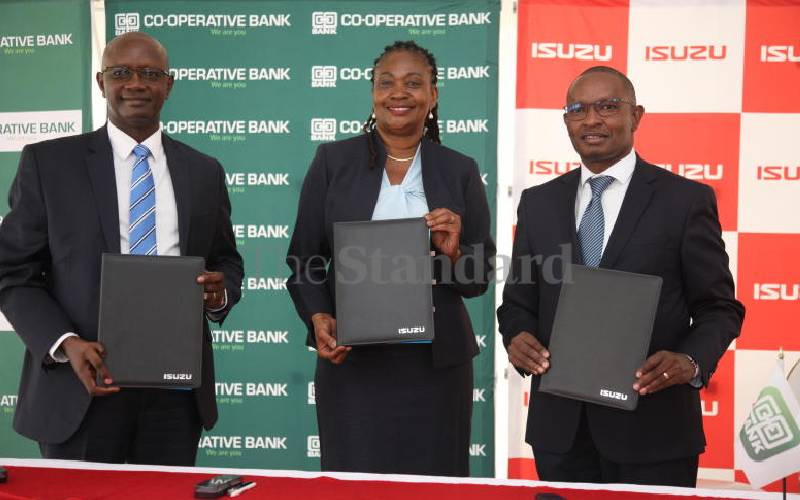
Isuzu Trucks and pickups at general motors PHOTO DAVID GICHURU
In Summary
- Total Industry sales for July this year was at 881 units compared to 1,100 units sold in the same period last year
- Consumption by the private sector has been partly constrained by the reduced flow of credit to the private sector.
NAIROBI, KENYA: Sale of commercial vehicles declined in the first seven months of this year, signaling a tough business environment.
According to a new report, sales of vehicles used for carrying goods and passengers, experienced a sharp decline compared to non-commercial vehicles between January and July, 2017.
In the latest July 2017 Hot Report by Isuzu East Africa (IEA), previously General Motors East Africa, save for medium trucks and mini-buses, sales of light trucks, heavy trucks, medium buses, prime movers and large buses declined steeply in the period under review.
Prime movers - the heavy haulers used for moving huge loads, particularly in the building and construction sector experienced the sharpest decline, going down by 61.5 per cent during this period.
A total of 180 prime movers were sold in the first seven months of this year, compared to 468 that were sold in the same period last year by the entire industry of over 10 automakers.
Sales of light trucks dipped by 22 per cent from 2,237 to 1,734; heavy trucks by 39 per cent from 674 to 411; medium buses by 38 per cent from 400 to 248; and large buses by 34.6 per cent from 376 in 2016 to 246 in 2017.
It was a difficult moment for car-makers, just as it has been for most businesses.
Sales across all types of vehicles plummeted during this period, declining by 19 per cent from 8,046 in the first seven months of 2016 to 6,490 in the same period of 2017.
Although the performance is a continuation of what has recently characterised the country’s auto-industry, the electioneering period might have played a key role.
Dr Scholastica Odhiambo, an Economics lecturer at Maseno University says the uncertainty around elections brought turbulence into the economy, with investors uncertain as to who was going to take over the Government. This saw most of investors take a wait-and-see approach.
Various industries
This might have informed the decision by most players in various industries ranging from construction to hospitality and transport.
Stay informed. Subscribe to our newsletter
This saw reduced uptake of commercial vehicles.
Car assembly companies also decided to manufacture less cars, anticipating depressed demand.
“During the elections, prices tend to go down and inflation might also go up as a result of political spending,” said Dr Odhiambo.
“Low prices, might discourage business people from bringing their goods into the market.”
The dismal performance was evident across all the classes of vehicles, except for SUVs, medium trucks and minibuses.
Although the report by July 2017 Hot Report by Isuzu did not give reasons for the decline, analysts point out that most investors might have withheld their money due to the heightened political environment in the run-up to the general elections which was concluded on August 8.
“Total Industry sales for July 2017 was at 881 units compared to 1,100 units sold in the same period in 2016 hence a volume decline of 19.9 per cent year-on-year,” according to the Hot Report by Isuzu East Africa.
From 2015, sale of cars in the country have been on a decline.
According the report, car sales rose from 11,050 units in 2010 reaching a high of 19,523 units in 2015 before they started plummeting.
In 2016, the sales went down by 40 per cent to 13,535. Newly registered motor vehicles and motor cycles dropped by 13.5 per cent to 213,715 in 2016, according to the Kenya National Bureau of Statistics in the Economic Survey 2017.
The sector experienced a 22.5 per cent reduction in the number of imported road motor vehicles in 2016 compared to 2015, signaling depressed consumption.
Consumption by the private sector has been partly constrained by the reduced flow of credit to the private sector, with the latest growth of 2.1 per cent the lowest since the Central Banks of Kenya began keeping tabs on the rate of lending by commercial banks to the private sector.
Interestingly, sales of sport utility vehicles such as Jeep and LandRover, went up during the period under review.
The Hot Report gives a record of sales by Crown, DT Dobie, General Motors East Africa, CMC, Simba Colt, Toyota, and Tata.
Nonetheless, the industry recently welcomed two new players - German automaker Volkswagen and French car maker Peugeot.
Although it is not clear why car sales are plunging, dealers in new cars have had to contend with intense competition from second-hand vehicles because of their low cost.
 The Standard Group Plc is a
multi-media organization with investments in media platforms spanning newspaper
print operations, television, radio broadcasting, digital and online services. The
Standard Group is recognized as a leading multi-media house in Kenya with a key
influence in matters of national and international interest.
The Standard Group Plc is a
multi-media organization with investments in media platforms spanning newspaper
print operations, television, radio broadcasting, digital and online services. The
Standard Group is recognized as a leading multi-media house in Kenya with a key
influence in matters of national and international interest.
 The Standard Group Plc is a
multi-media organization with investments in media platforms spanning newspaper
print operations, television, radio broadcasting, digital and online services. The
Standard Group is recognized as a leading multi-media house in Kenya with a key
influence in matters of national and international interest.
The Standard Group Plc is a
multi-media organization with investments in media platforms spanning newspaper
print operations, television, radio broadcasting, digital and online services. The
Standard Group is recognized as a leading multi-media house in Kenya with a key
influence in matters of national and international interest.







